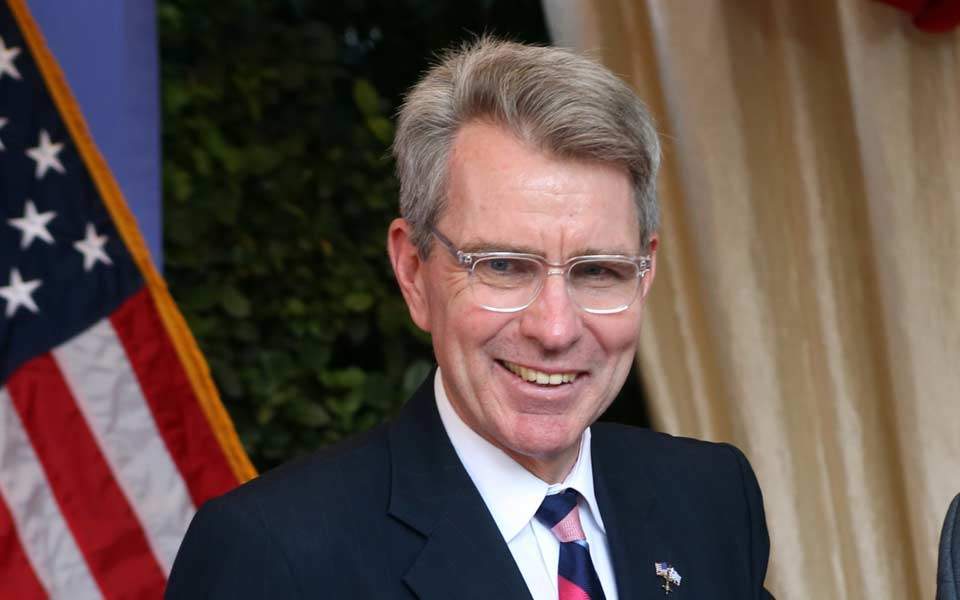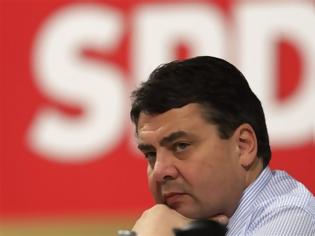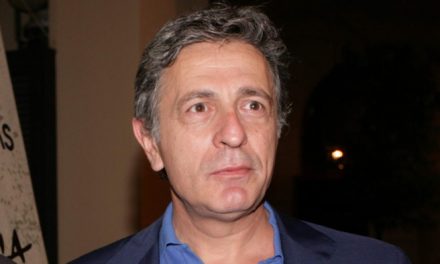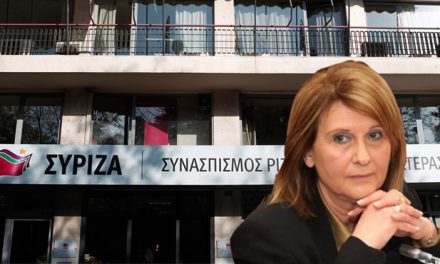Ομιλία του Αμερικανού πρέσβη σε εκδήλωση του Ελληνικού Ιδρύματος Ευρωπαϊκής και Εξωτερικής Πολιτικής (ΕΛΙΑΜΕΠ)
Η εμβάθυνση των σχέσεων με την Ελλάδα έχει ισχυρή διακομματική υποστήριξη από τις ΗΠΑ, επισήμανε ο αμερικανός πρεσβευτής, μιλώντας σε εκδήλωση του Ελληνικού Ιδρύματος Ευρωπαϊκής και Εξωτερικής Πολιτικής (ΕΛΙΑΜΕΠ) σε κεντρικό ξενοδοχείο της Αθήνας για τη γεωπολιτική αξία της Ελλάδας και τις ελληνοαμερικανικές σχέσεις.
Ο Τζέφρι Πάιατ έστειλε το μήνυμα πως ο Στρατηγικός Διάλογος Ελλάδας και ΗΠΑ έχει αναβαθμίσει και έχει θεσμοποιήσει πλέον τη σχέση των δύο χωρών, και παρέθεσε αποσπάσματα από τις δηλώσεις του υπουργού Εξωτερικών Μάικ Πομπέο τον Δεκέμβριο στη συνέντευξη Τύπου μαζί με τον υπουργό Εξωτερικών Γ. Κατρούγκαλο:
«Ο Στρατηγικός Διάλογος ήταν το αποκορύφωμα μιας χρονιάς «ιστορικής προόδου», καθώς οι δύο χώρες μας «έχουν μετατρέψει τις ευκαιρίες σε συγκεκριμένα επιτεύγματα». «Η Ελλάδα υπήρξε κρίσιμος σύμμαχος των Ηνωμένων Πολιτειών» και «τώρα περισσότερο από ποτέ». «Είμαστε στην ευχάριστη θέση να δούμε ότι η Ελλάδα θα αναδειχθεί για άλλη μια φορά ως ηγέτης – ένας πυλώνας περιφερειακής σταθερότητας στην Ανατολική Μεσόγειο»».
Τα εγκώμια Πομπέο
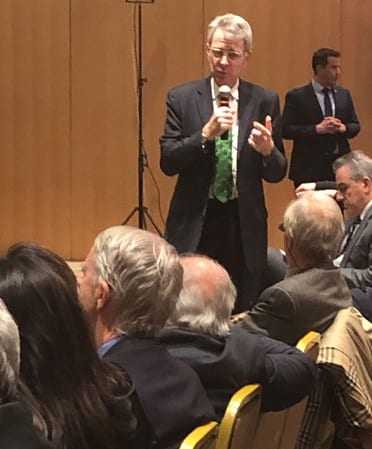 Επικαλούμενος επίσης την αναφορά του υπουργού Εξωτερικών των ΗΠΑ Μάικ Πομπέο προς τον έλληνα ομόλογό του Γιώργο Κατρούγκαλο, ότι «οι ΗΠΑ αναγνωρίζουν την Ελλάδα ως βασικό παράγοντα στην περιοχή», ο κ. Πάιατ είπε πως αυτό συνοψίζει πώς σκέφτεται ο ίδιος τις ελληνοαμερικανικές σχέσεις.
Επικαλούμενος επίσης την αναφορά του υπουργού Εξωτερικών των ΗΠΑ Μάικ Πομπέο προς τον έλληνα ομόλογό του Γιώργο Κατρούγκαλο, ότι «οι ΗΠΑ αναγνωρίζουν την Ελλάδα ως βασικό παράγοντα στην περιοχή», ο κ. Πάιατ είπε πως αυτό συνοψίζει πώς σκέφτεται ο ίδιος τις ελληνοαμερικανικές σχέσεις.
Σημείωσε επίσης πως κάθε αμερικανική αντιπροσωπεία που έρχεται στην Αθήνα εκφράζει εκτίμηση για τον μοναδικό γεωπολιτικό ρόλο της Ελλάδας.
«Το κλειδί στη σχέση μας είναι η σύγκλιση στα συμφέροντα ασφάλειας, οι κοινές μας αξίες και οι κοινοί στόχοι για την περιφερειακή ασφάλεια, σταθερότητα και ευημερία» υπογράμμισε.
Σε αυτό το πλαίσιο, ο πρεσβευτής των ΗΠΑ έκανε λόγο για δυναμική στις σχέσεις των δύο χωρών και ανέφερε πως η γεωστρατηγική θέση αποτελεί προστιθέμενη αξία στην Ελλάδα.
«Είμαι ενθουσιασμένος για την οικοδόμηση μιας δυναμικής στις σχέσεις Ελλάδας και ΗΠΑ και χαίρομαι ότι η Ουάσιγκτον κατανοεί και καταλαβαίνει τον κρίσιμο περιφερειακό ρόλο της Ελλάδας» σημείωσε.
Ειδική αναφορά στην ενέργεια
Ειδική αναφορά έκανε στην ενέργεια, λέγοντας πως η ιστορική ολοκλήρωση του Δια-αδριατικού αγωγού, η επιτυχημένη επέκταση του τερματικού σταθμού αερίου στη Ρεβυθούσα και η πρόοδος στον διασυνδετήριο αγωγό Ελλάδας-Βουλγαρίας (IGB), συμβάλλουν στην ένταξη της Ελλάδας στον παγκόσμιο ενεργειακό χάρτη και στην ποικιλομορφία των ενεργειακών πηγών και ως κόμβο για την περιοχή αυτή.
Επίσης, ο Τζέφρι Πάιτ στάθηκε στο εμπόριο και τις επενδύσεις, αναφέροντας ότι κατά το παρελθόν έτος, έχουμε δει μερικά μεγάλα και νέα αμερικανικά έργα στην τουριστική βιομηχανία μέσω των Avis, Hyatt, Marriott και άλλων και το ναυπηγείο Νεώριο στη Σύρο μέσω της Onex.
«Ακούμε από όλο και περισσότερους αμερικανούς επενδυτές ότι ενδιαφέρονται και πάλι για την Ελλάδα» σημείωσε.
Εστίασε ακόμα στη συνεργασία των δύο χωρών στην άμυνα, την ασφάλεια και την καταπολέμηση της τρομοκρατίας, τονίζοντας πως βλέπουμε την πιο στενή συνεργασία στην ιστορία των διμερών μας σχέσεων.
Τέλος, προανήγγειλε ότι οι ΗΠΑ θα πραγματοποιήσουν φέτος, στο πλαίσιο του Στρατηγικού Διαλόγου, μεγάλη περιφερειακή εκπαιδευτική διάσκεψη στη βόρεια Ελλάδα, ενώ επισήμανε πως πανεπιστήμια των ΗΠΑ, όπως το Πρίνστον, το Πανεπιστήμιο της Βιρτζίνια και το Πανεπιστήμιο της Νέας Υόρκης συνεχίζουν να επεκτείνουν την παρουσία τους στη χώρα μας.
Ολόκληρη η ομιλία του κ. Pyatt έχει ως εξής:
Καλησπέρα. Good evening. Thank you very much. I’m really honored to be part of this discussion, and I want to congratulate ELIAMEP for putting it together.
ELIAMEP’s contribution to the public dialogue in Greece is a great example of the appreciation for free expression and democratic values that Greece and the United States hold in common. So, it’s no wonder that we consider ELIAMEP to be a really great Embassy partner.
I want to start this evening by reiterating something that has proven true time and again during my now two and a half years as American Ambassador in Greece: deepening the U.S.-Greece relationship has strong bipartisan support in the United States.
When former President Obama came to Greece shortly after my arrival, he stressed that U.S. support for Greece’s economic recovery was a priority over the course of his administration. And just over a year later, in Washington in the Rose Garden, President Trump reaffirmed with Prime Minister Tsipras our support for Greece and formally accepted our status as the honored country at the 2018 Thessaloniki International Fair, an event that became a celebration of our growing trade and commercial relationship but also a signal of U.S. confidence in Greece’s economic recovery.
At TIF, Commerce Secretary Wilbur Ross pointed out that the presence of over 50 U.S. companies at TIF was unprecedented in his experience, and likewise, Senator Ron Johnson of the Senate Europe Subcommittee said much the same thing. And of course, there were many others there from across the U.S. government, serving as a measure of U.S. interest in Greece.
TIF was a tough act to follow, but just two months later, Minister Katrougalos and Secretary of State Pompeo launched the first U.S.-Greece Strategic Dialogue in Washington, with an impressive depth of interagency participation, committed to sustaining the momentum in our bilateral ties in six specific areas:
Specifically,
- regional cooperation
- defense and security
- law enforcement and counter terrorism
- trade and investment
- energy, and people-to-people ties.
The Strategic Dialogue elevated and institutionalized our relationship in a manner consistent with how many of the Embassy’s long-time friends have viewed the U.S.-Greece alliance. And I want to thank Minister Katrougalos for recently hosting a bilateral working group to follow up on several of these areas with a broad assembly of Greek government experts – reflecting how both of our governments are committed to building on the foundation that the Strategic Dialogue provides.
At the Munich Security Conference, Prime Minister Tsipras met with a large, bipartisan and very senior delegation from the U.S. Congress, all of whom expressed their strong appreciation for Greece’s role as a pillar of stability in the region, Greece’s impressive contributions during the refugee crisis, its creative implementation of the Prespes Agreement, and our efforts to continue deepening the bilateral defense and security relationship.
In Washington, the stock of the U.S.-Greece relationship today is higher than it has been for many years, and that is reflected as well in the unprecedentedly large American delegation that will be at the Delphi Forum this weekend.
I also want to underscore that every U.S. delegation that passes through Athens expresses a similar appreciation for Greece’s unique geopolitical role. Last week, for instance, we hosted two senior Congressional staff members, including the chief of staff of the Senate Foreign Relations Committee, and they met with a broad cross-section of Greek political and civil society leaders. Their meetings included government officials, party leaders from New Democracy, as well as current and retired military personnel and other leading thinkers from academia.
I am glad that these colleagues were able to listen to George Koumoutsakos, who shared his thoughts on the strategic importance of our bilateral relationship and the need to continue capitalizing on the momentum we’ve been building up. And Minister Katrougalos, I can assure you that they also had excellent meetings with your colleagues at the Ministry of Foreign Affairs.
And so I think I speak with some authority when I say that in Greece, too, deepening the U.S.-Greece bilateral relationship is an issue above partisan politics. The key to this happy state of affairs is our converging security interests, our shared values and our shared goals on regional security, stability and prosperity.
And at this point, I’d like to briefly address the momentum in our relationship and some of the concrete ways that Greece and its geostrategic location add value, as the subject of this evening’s panel puts it.
On energy, we are seeing the historic completion of the Trans-Adriatic Pipeline, the successful expansion of the Revythoussa gas terminal, and irreversible progress on the Greece-Bulgaria Interconnector, the IGB. All these projects help to put Greece on the world energy map as a contributor to the diversity of energy sources and as a hub for this region.
The expansion of the Revythoussa LNG terminal was immediately followed by the first delivery of U.S. LNG, another important milestone, which we celebrated at the Strategic Dialogue, which in turn contributes greatly to energy security in the wider region. We expect a second U.S. LNG delivery very soon and remain actively engaged, as well, to support the Floating Regasification Unit in Alexandropouli.
On trade and investment, over the past year, we’ve seen some big, new American projects in the tourism industry through Avis, Hyatt, Marriott and others, and the Neorion shipyard in Syros through Onex. We are hearing from more and more American investors that they are again interested in Greece; however, increasing U.S. investment will also require increased commitment on the Greek side to reforms and transparent privatizations.
In this regard, we are encouraged that the Request for Proposals for the Hellenikon project was issued last week, and we are hopeful that some top U.S. entertainment companies will put forward competitive and compelling bids for that transformative project.
I would also highlight the upcoming SelectUSA Summit, which I will again attend in Washington. Greek businesses — like Pyramis in Thessaloniki, which is a top supplier to IKEA in America, or Yoleni’s, one of my favorite places to enjoy Greek food — have used SelectUSA to help in their efforts to expand their operations in the U.S., reinforcing our mutually beneficial business ties.
On counter-terrorism cooperation, defense and security, we are seeing some of the closest cooperation in the history of our bilateral relationship. NSA Souda Bay is busier than ever. In December, we conducted our largest ever joint counter-terrorism exercise, and in January we saw the continuation of the large-scale Alexander the Great exercises between our Marines in Volos and the rotation of the 4thCombat Aviation Brigade of the U.S. Army through Stefanovikio, and next month, the 4thCAB aviation elements from all over Europe will converge in Thessaloniki as they prepare to head home to the United States.
Through these exercises and working together, the United States is gaining a better appreciation for Greece’s ability to leverage its unique location to develop high quality training ranges, and we hope to develop these capacities further. I would also note Greece’s lead role in maritime surveillance, which dovetails with the United States’ Maritime Domain Awareness efforts in the Black Sea and Eastern Mediterranean.
On people-to-people ties, with the support of the Ministry of Education, we moved forward this year with the launch of a new education exchange program in Greece – the Future Leaders Exchange Program, or FLEX.
FLEX will provide scholarships for ten Greek high school students – students from public schools across Greece, who otherwise would not have such an opportunity to study in the United States for a year. And as we pledged at the Strategic Dialogue, we will be bringing in a large regional educational conference, the Gilman Scholar Summit, to northern Greece later this year. And meanwhile, U.S. universities like Princeton, the University of Virginia and NYU continue to expand their presence here.
I am excited about the momentum building in the U.S.-Greece relationship, and I am delighted that there is a growing constituency in Washington that now understands and appreciates Greece’s critical regional role.
My boss, Secretary of State Mike Pompeo, recently visited some of Greece’s central European neighbors, including Hungary, Slovakia, and Poland. There, he focused on the importance of our NATO alliance as well as the upcoming challenges and our commitment to helping the people of Europe remain free – especially as Russia and China compete with us for global influence. He also stressed the importance of protecting and strengthening democratic institutions throughout the Western world.
As Secretary of State Pompeo said in December in his press conference with Minister Katrougalos, the Strategic Dialogue capped a year of “historic progress” as our two countries “have turned opportunities into concrete achievements.” “Greece has been a critical ally of the United States,” and “Now more than ever,” he added, “we are pleased to see Greece emerge once again as a leader — a pillar of regional stability in the Eastern Mediterranean.”
“The U.S.,” he reiterated, “is looking to strengthen our relationship with stable democracies and allies there, allies like Greece and Cyprus and Israel.” Secretary Pompeo then turned to Minister Katrougalos and reiterated that “The U.S. recognizes you as a key player in the region, and we want to thank you so much for being an excellent ally.”
So that’s what my boss said, and I think it sums up pretty well how we think about our relationship as Greece heads into an election year. So with that, I look forward to hearing from Minister Katrougalos, Shadow Minister Koumoutsakos and the discussion that follows.Ευχαριστώ πολύ.
First of all, thank you for having me here tonight – Lou, Konstantine – all the founders of the East Mediterranean Business Cultural Alliance. I’m especially pleased and honored to be on a panel that includes so many friends and especially Admiral Pavlopoulos, who has done so much over the years to deepen and build the alliance between our maritime sectors.
I’m also glad to see here such a wide cross section of the Greek-American diaspora, but also the global shipping community.
I want to start by congratulating you on the initiative to create a memorial in New York to honor the sacrifices of the Hellenic Merchant Marine and Shipping Industry during WWII, and to commemorate U.S. support to Greece via the Marshall Plan’s Liberty Ships.
I am always happy to take part in events that shed a spotlight on an industry that has been so fundamental to the U.S.-Greece bilateral relationship.
When you look back at the aftermath of World War II, when the Greek fleet was decimated, it’s quite amazing the progress that’s been achieved so that today the Greek shipping fleet represents the largest non-military asset in the world for transporting goods.
And I must say, and I appreciate George’s remarks, that there is no better setting to reflect on the maritime ties between our two countries than here on board Hellas Liberty. Every time I visit I visit this ship, I am filled with pride at the testament this vessel bears to how the Marshall Plan replaced so many of the ships that Greece lost during the war and revitalized the Greek shipping industry so that it could roar back to the global leadership role that it enjoys today.
Over the past year the United States and the Embassy here have significantly increased our engagement with Greece in the maritime sector. Most importantly, I want to highlight tonight the first-ever delivery of U.S. liquefied natural gas to Greece and to the entire Balkan region, which took place last December. In that case, a Greek-flagged vessel from the Tsakos fleet brought the shipment from Corpus Christie, Texas to Revythousa, where it was one of the first to arrive at the newly expanded LNG terminal. And there’s a good chance, as we all shiver through this relatively cold weather in Athens this year that it’s U.S. gas helping to keep us warm.

